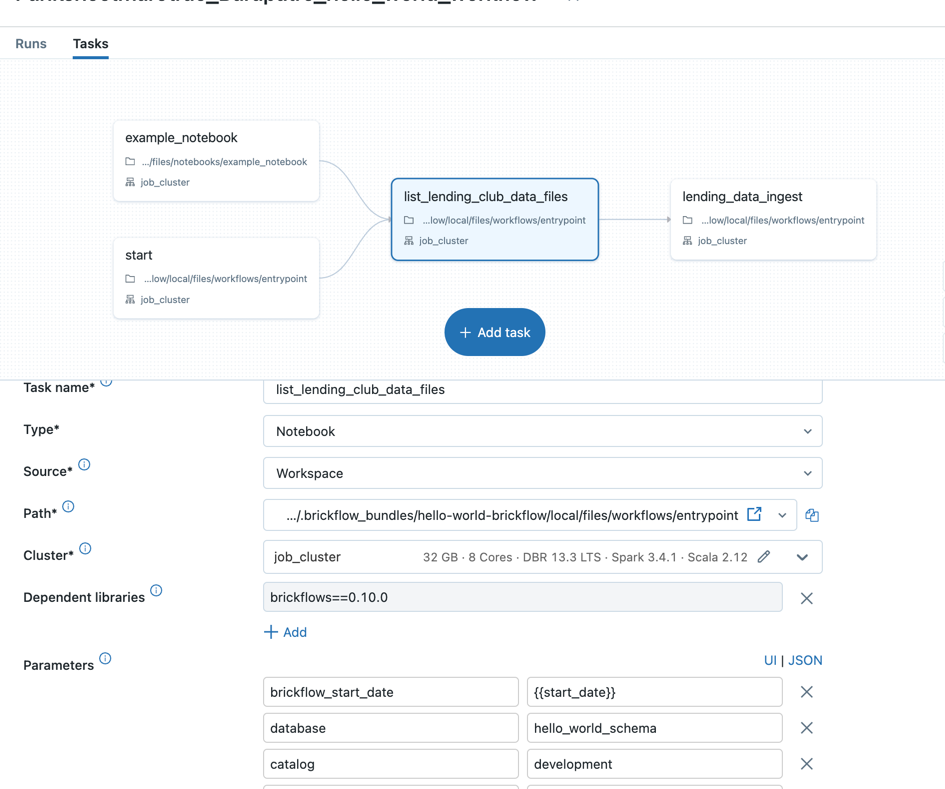
Security News
Oracle Drags Its Feet in the JavaScript Trademark Dispute
Oracle seeks to dismiss fraud claims in the JavaScript trademark dispute, delaying the case and avoiding questions about its right to the name.
BrickFlow is specifically designed to enable the development of Databricks workflows using Python, streamlining the process through a command-line interface (CLI) tool.

Thanks to all the contributors who have helped ideate, develop and bring Brickflow to its current state.
We're delighted that you're interested in contributing to our project! To get started, please carefully read and follow the guidelines provided in our contributing document.
Brickflow documentation can be found here.
pip install brickflows
curl -fsSL https://raw.githubusercontent.com/databricks/setup-cli/main/install.sh | sudo sh
~/.databrickscfg file.databricks configure --token
mkdir hello-world-brickflow
cd hello-world-brickflow
brickflow projects add
Project name: hello-world-brickflow
Path from repo root to project root (optional) [.]: .
Path from project root to workflows dir: workflows
Git https url: https://github.com/Nike-Inc/brickflow.git
Brickflow version [auto]:<hit enter>
Spark expectations version [0.5.0]: 0.8.0
Skip entrypoint [y/N]: N
Note: You can provide your own github repo url.
touch workflows/hello_world_wf.py
from brickflow import (
ctx,
Cluster,
Workflow,
NotebookTask,
)
from airflow.operators.bash import BashOperator
cluster = Cluster(
name="job_cluster",
node_type_id="m6gd.xlarge",
spark_version="13.3.x-scala2.12",
min_workers=1,
max_workers=2,
)
wf = Workflow(
"hello_world_workflow",
default_cluster=cluster,
tags={
"product_id": "brickflow_demo",
},
common_task_parameters={
"catalog": "<uc-catalog-name>",
"database": "<uc-schema-name>",
},
)
@wf.task
# this task does nothing but explains the use of context object
def start():
print(f"Environment: {ctx.env}")
@wf.notebook_task
# this task runs a databricks notebook
def example_notebook():
return NotebookTask(
notebook_path="notebooks/example_notebook.py",
base_parameters={
"some_parameter": "some_value", # in the notebook access these via dbutils.widgets.get("some_parameter")
},
)
@wf.task(depends_on=[start, example_notebook])
# this task runs a bash command
def list_lending_club_data_files():
return BashOperator(
task_id=list_lending_club_data_files.__name__,
bash_command="ls -lrt /dbfs/databricks-datasets/samples/lending_club/parquet/",
)
@wf.task(depends_on=list_lending_club_data_files)
# this task runs the pyspark code
def lending_data_ingest():
ctx.spark.sql(
f"""
CREATE TABLE IF NOT EXISTS
{ctx.dbutils_widget_get_or_else(key="catalog", debug="development")}.\
{ctx.dbutils_widget_get_or_else(key="database", debug="dummy_database")}.\
{ctx.dbutils_widget_get_or_else(key="brickflow_env", debug="local")}_lending_data_ingest
USING DELTA -- this is default just for explicit purpose
SELECT * FROM parquet.`dbfs:/databricks-datasets/samples/lending_club/parquet/`
"""
)
Note: Modify the values of catalog/database for common_task_parameters.
mkdir notebooks
touch notebooks/example_notebook.py
# Databricks notebook source
print("hello world")
brickflow projects deploy --project hello-world-brickflow -e local

Refer to the examples for more examples.
FAQs
Deploy scalable workflows to databricks using python
We found that brickflows demonstrated a healthy version release cadence and project activity because the last version was released less than a year ago. It has 1 open source maintainer collaborating on the project.
Did you know?

Socket for GitHub automatically highlights issues in each pull request and monitors the health of all your open source dependencies. Discover the contents of your packages and block harmful activity before you install or update your dependencies.

Security News
Oracle seeks to dismiss fraud claims in the JavaScript trademark dispute, delaying the case and avoiding questions about its right to the name.

Security News
The Linux Foundation is warning open source developers that compliance with global sanctions is mandatory, highlighting legal risks and restrictions on contributions.

Security News
Maven Central now validates Sigstore signatures, making it easier for developers to verify the provenance of Java packages.